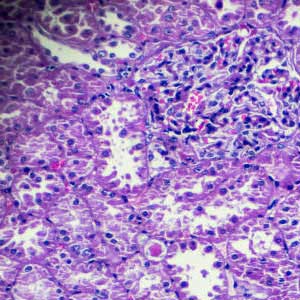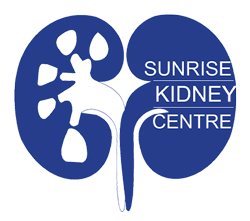Kidney Biopsy hospital in Vijayawada
What is kidney biopsy?
Kidney biopsy is the surgical procedure performed to eliminate a small piece of kidney tissue that is inspected under the microscope to check the signs of damage or diseases.
Nephrology specialist in Vijayawada may recommend a kidney biopsy for diagnosing a kidney issue. It can be utilized to see how severe is the kidney condition or to monitor the kidney disorder.
Kidney biopsy done by kidney biopsy doctors in AP is also needed if you had kidney transplant and it's not working properly.
There are two ways for performing a renal biopsy:
- Percutaneous biopsy (renal needle biopsy). This is the most common type of renal biopsy. For this procedure, a specialist places a thin biopsy needle through the skin to eliminate your kidney tissue. They might utilize a ultrasound or CT scan to direct the needle to a particular region of the kidney.
- Open biopsy (surgical biopsy). For this procedure, your doctor makes a cut in the skin close to the kidneys. This permits the doctor to take a view at the kidneys and determine the region from which the tissue samples ought to be taken
Preparation for a renal biopsy
Normally, you don't have to do much to prepare for a renal biopsy.
Make sure to tell your doctor about any prescribed drugs, over-the-counter meds, and herbal supplements you're taking. You ought to discuss with them whether you ought to stop taking them before and during the test, or if you must change the dosage.
Your doctor might give special instructions if you're taking meds that could influence the results of the renal biopsy. These meds include:
- anticoagulants (blood thinners)
- nonsteroidal anti-inflammatory drugs
- any meds that influence blood clotting
- herbal or dietary supplements
Inform your doctor if you are pregnant or figure out that you may be pregnant. Likewise, before your renal biopsy, you'll have a blood test and give a urine sample. This guarantees that you have no preexisting infections.
You need to fast from food and drink for at least around eight hours preceding your kidney biopsy.
If you're given a sedative to take at home before the biopsy, you will not be able to drive yourself to the procedure and need to arrange for transportation.
How is it performed?
Doctor at kidney biopsy hospitals in Vijayawada would perform the biopsy by placing a thin needle through the skin, this is known as percutaneous kidney biopsy. Imaging device assists the doctor to direct the needle into the kidney to eliminate the tissue.
What are the reasons for kidney biopsy?
Kidney biopsy is performed for various reasons:
- To diagnose the kidney problem which can't be otherwise identified
- To help develop treatment plans depending upon the kidney's condition
- To determine quickly how kidney disorder is advancing
- To determine the extent of damage from kidney disease or another disorders
- To evaluate how well kidney disease treatment is functioning
- To monitor the health of a kidney transplanted or why the kidney transplanted is not working.

Dr. M. V. Sai Krishna is the best kidney specialist who provides patients with the best level of medical care, while practicing empathy for them he is top Nephrologist at Sunrise Kidney Centre offering Peritoneal Dialysis treatment in vijayawada
Busting few myths on Kidney biopsy !
Myth: Kidney biopsy is a routine procedure that can be done in the doctor's office.
Fact: Kidney biopsy is a surgical procedure that requires general anesthesia and is typically performed in a hospital or outpatient surgery center.
Myth: A kidney biopsy is always necessary to diagnose kidney disease.
Fact: A kidney biopsy may be necessary to confirm the diagnosis of kidney disease, but it's not always necessary. In some cases, other tests such as imaging studies, blood tests, and urine tests can provide enough information to diagnose the condition.
Myth: A kidney biopsy is only necessary for people with advanced kidney disease.
Fact: A kidney biopsy can be useful for people with early stages of kidney disease, as well as those with advanced disease. It can help diagnose conditions such as focal segmental glomerulosclerosis (FSGS), membranous nephropathy, and lupus nephritis.
Myth: A kidney biopsy carries significant risks and complications.
Fact: While any medical procedure carries some risks and complications, a kidney biopsy is generally considered to be a safe procedure. The most common complications are bleeding at the biopsy site, infection, and damage to the surrounding tissues. However, these complications are usually mild and temporary.
Understanding FAQS of kidney biopsy
How is a kidney biopsy performed?
A kidney biopsy is typically performed under general anesthesia and involves inserting a needle into the lower back to obtain a small sample of tissue from the kidney.
How long does a kidney biopsy take?
The procedure typically takes about 30-60 minutes to complete.
Can I go home the same day after a kidney biopsy?
Yes, most people are able to go home the same day after a kidney biopsy, but you may need to stay overnight in the hospital if you have any complications or underlying medical conditions.
How long will it take to get the results of my kidney biopsy?
The results of your kidney biopsy will typically be available within 1-2 weeks after the procedure.
Will I need to take any medication after a kidney biopsy?
You may need to take medication after a kidney biopsy to help manage pain or discomfort. Your healthcare provider will provide you with specific instructions on what medications you should take and how often you should take them.
Are there any lifestyle changes I need to make after a kidney biopsy?
After a kidney biopsy, you should avoid strenuous activities such as heavy lifting or bending for several days. You should also drink plenty of water and follow your healthcare provider's instructions on how to manage your diet and fluids.

